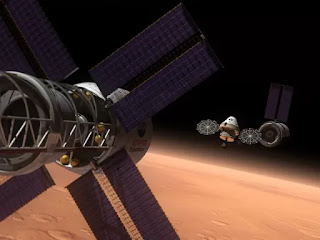 |
| Picture I |
Kimmo Huosionmaa
After this text is one short film, what crystallizes the reason, why robots are so terrifying military machines. What makes robots so fascinating soldiers, is that they follow always the orders. Robots would not think the same way as we do, and their thinking bases the linear programming. The term "linear programming" means that the robot would follow the program if there would not be interrupts. In some scenarios, the superpowers would start together and then they would send the robot spacecraft to the far away beyond the Kuiper belt. Those robot spacecraft missions would make the attack against the enemy by using some "doomsday" weapon, in the case, where the own side would be destroyed.
This scenario is straight from the hypothesis, that there would be patrolling the robot submarines at the sea, what are ready to shoot their missiles if they get orders to use their nuclear missiles or the signal to command base would be cut. This scenario is very terrifying because nobody hasn't thought the scene, where the communication between the base and robot vehicle would be cut by reason of technical problems in the probe. In this scenario, the central computer of the probe would start the attack against the predicted enemy.
Even the conflict has been ended, those robot drones continue their mission, and that makes them so terrifying weapon. Those drones would send to Kuiper belt, and then they would be in there for waiting orders, and there would not be corrosion in that distance from the Sun. Then the "everything Ok" signal would be cut, and the probe will start to operate. When we are thinking about the techniques, what those fictional probes I hope, would be used, could be very terrifying and advanced.
They might be equipped with Von Neumann-factories, what can build the repair parts for the probe, and the same factories would be used to make ammunition for the rail guns of that machine. But in the worst scenario those probes could make copies of themselves, and even we have sent one of those intelligent probes to Universum, we might face the situation, where there would be thousands of those military probes. I hope that this writing is only fiction, and this program is only in my head.
But who knows, what military leaders in the Moscow and Washington think? This kind of drones would be the replacer for nuclear missiles, but if they would equip with rail guns, what would accelerate the speed of ammunition near the speed of light, could those systems destroy even the planet. The kinetic energy in those high power railguns would be so devastating, that the Earth will face same fate with planet Mars. And that's why this kind of technology will be devastating in the wrong hands.
The film I mentioned
https://www.youtube.com/watch?v=IjJmTeBSEzU
Picture I
https://img.purch.com/w/660/aHR0cDovL3d3dy5zcGFjZS5jb20vaW1hZ2VzL2kvMDAwLzAwOS84MTgvb3JpZ2luYWwvbmFzYS1kZWVwLXNwYWNlLXZlaGljbGUtbXBjdi1hcnQuanBn




No comments:
Post a Comment
Note: Only a member of this blog may post a comment.